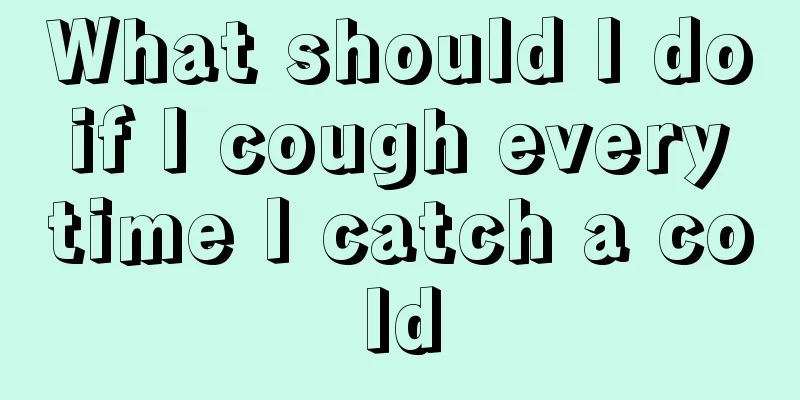What should I do if I cough every time I catch a cold

|
Cold is a very common disease for many people. Moreover, colds are recurrent, so they often come easily but go away easily. Moreover, since everyone's physique is different, the causes of colds are also varied, so many times the symptoms of colds are different, but they are all called colds. Many people cough when they have a cold. When the respiratory tract is not clean enough and there are foreign objects or secretions, the human body can clear out the foreign objects in the respiratory tract by coughing. It may occur after an upper respiratory tract infection, a cold, a change of seasons, or after catching a cold in the rain. If not effectively controlled, this upper respiratory tract problem can easily develop into a lower respiratory tract infection such as acute tracheitis, acute bronchitis or pneumonia. Nowadays, for many reasons, many people like to take cold medicine when they have early symptoms of respiratory diseases such as fever, sore throat, runny nose, sneezing and coughing. However, if the cough does not go away within a week or even two weeks after taking medicine, it is best not to take antibiotics or cough medicine anymore. Instead, go to the hospital to check the lungs, bronchi, pleura and other parts to rule out other possible diseases. Coughing is a common symptom of respiratory diseases. It is a protective reflex of the respiratory tract, which helps to expel harmful substances such as sputum and foreign objects. Therefore, a mild cough is beneficial and does not require medication. However, severe, frequent, or even spasmodic coughing requires prompt medical attention. Sputum is the excessive secretion produced by the glands and cells on the bronchi during respiratory inflammation. Sputum can irritate the respiratory mucosa and cause coughing. The sputum is coughed up, which is called expectoration. When sputum occurs, anti-inflammatory and expectorant drugs should be used to relieve cough and sputum. Frequent coughing is more common in chronic bronchitis, etc.; paroxysmal coughing is more common in bronchial asthma, foreign bodies in the respiratory tract, etc.; morning coughing is more common in chronic inflammation or smokers; night coughing is more common in tuberculosis, whooping cough, etc. Coughing up phlegm, etc. When coughing up sputum, the sputum may be different depending on the disease and course of the disease. Some may be yellow, brown, or green, and may even contain blood. 1. Buy a pear (bigger), peel it, cut off the head (leave some flesh), use it as the lid, remove the pear core, put the pear core into the pear core (the more expensive Sichuan Fritillaria, you have to ask the pharmacy to grind it into powder), cover the pear core with the original cut lid, insert two toothpicks on the side, put it in a large bowl with water, DUN it in water, and then add rock sugar after ten minutes. You can also take out one toothpick at this time to let some Sichuan Fritillaria in the soup. You have to eat all the soup and pears. Eat them for two days in a row, one a day, no more, because they taste good and are also good for children. 2. Steamed pear with Fritillaria cirrhosa (specially for: cough) Ingredients: one snow pear or duck pear, 6 grams of Fritillaria cirrhosa, and 20 grams of rock sugar. Preparation and administration: Cut the pear at the stem, hollow out and remove the core, then grind the Fritillaria cirrhosa into powder. Put it into the pear and use a toothpick to restore and secure the handle. Put rock sugar in a large bowl, add a small amount of water, and steam for half an hour. Eat the steamed pear with the Fritillaria cirrhosa in it. Indications and functions: Fritillaria is a good medicine for resolving phlegm and relieving cough. When used together with snow pear and rock sugar, it has the effects of resolving phlegm and relieving cough, moistening the lungs and nourishing yin. Treats chronic cough, excessive sputum, dry throat, shortness of breath and fatigue. After catching a cold, remember not to take medicine blindly. Because the cause of a cold may be different each time, and the symptoms may also be different. Therefore, once you find that you have a cold, the first thing you need to do is to find out the cause of your cold and then take the appropriate medicine. In short, when you are sick, don't take it for granted. It is best to follow the doctor's instructions. |
<<: What's the matter with the white spots on the tonsils
Recommend
What is eight points full?
There is an old Chinese saying that is very good:...
The quality of hair improves after not washing it for a month
If you don't wash your hair for a month, the ...
How to avoid insomnia
Nowadays, many people have varying degrees of sle...
Thin people have many hidden diseases
Many elderly people believe that “being thin in o...
How to do foreplay better for women
When men and women have sex, they cannot get stra...
Can patients with thyroid cancer sweat steam after subtotal thyroidectomy
Subtotal thyroidectomy generally refers to partia...
What is the reason for the stomach to always vomit gas
Each of us will experience gastric belching and b...
What are the scientific methods to increase height quickly
Everyone wants to be tall so that they can have m...
What to do with gingivitis
Gingivitis is a very painful disease. Gingivitis ...
Several major causes of tongue cancer
Do you know the major causes of tongue cancer? Th...
Can liver cancer be inherited from generation to generation?
Liver cancer is a serious disease that may occur ...
Postoperative adjuvant radiotherapy can improve the survival rate of pancreatic cancer patients
Radical surgical resection is currently the only ...
What to do if you have rib pain due to coughing
If you run without warming up, you will often exp...
What are the initial symptoms of skin cancer?
Skin cancer is a rare malignant skin disease in o...
The effect of grape collagen chewable tablets
The benefits of collagen are numerous, mainly bec...









